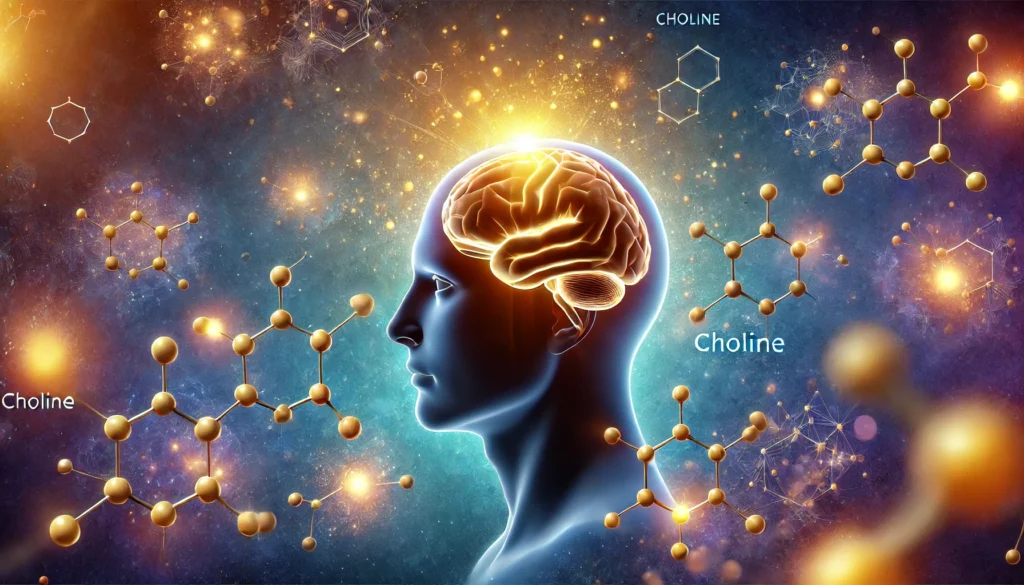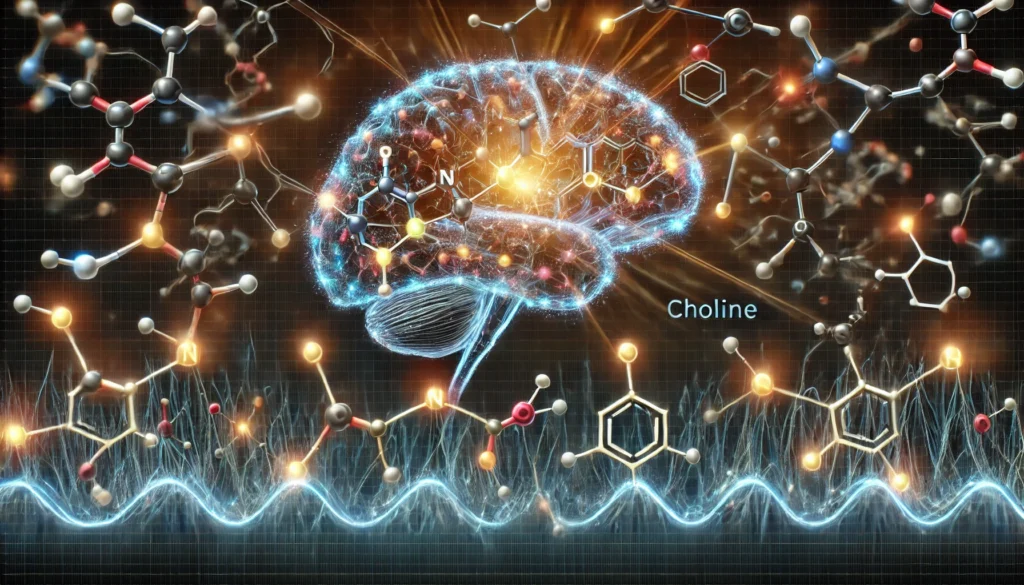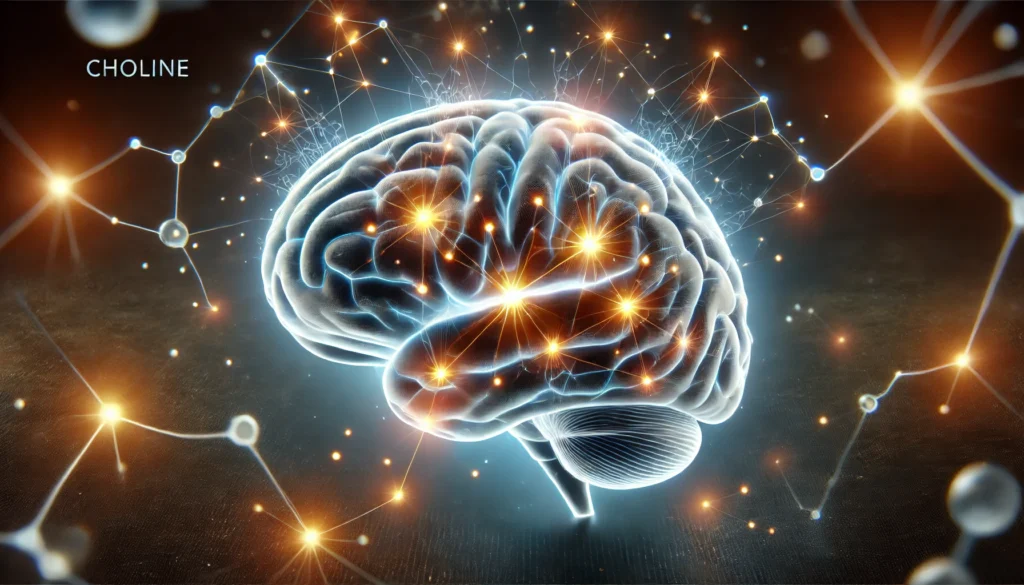Understanding Choline: An Essential Nutrient for Brain Health
Choline is a water-soluble nutrient that plays a critical role in various physiological functions, particularly in brain health. While it is often grouped with B vitamins, choline is unique in its structure and function, serving as a precursor to the neurotransmitter acetylcholine and contributing to cell membrane integrity and methylation processes. The human body can produce small amounts of choline in the liver, but the majority must be obtained through diet. Foods rich in choline include eggs, liver, fish, nuts, and cruciferous vegetables. Despite its importance, many individuals do not consume adequate amounts of choline, potentially leading to neurological and psychological health issues, including depression and anxiety.
You may also like: The Best Adaptogens for ADHD: How Rhodiola Rosea May Improve Focus and Reduce Stress
The significance of choline in neurological function extends beyond its role as a precursor to acetylcholine. It is also a vital component in the synthesis of phosphatidylcholine and sphingomyelin, both essential for maintaining neuronal structure and function. Given its fundamental role in neurotransmission, choline’s impact on mental health—specifically in relation to depression and anxiety—has become a growing area of interest in neuropsychiatric research.

The Link Between Choline and Depression
Depression is a multifaceted disorder characterized by persistent feelings of sadness, loss of interest, and cognitive dysfunction. While the exact pathophysiology remains complex, neurotransmitter imbalances, inflammation, and oxidative stress are key contributing factors. Research suggests that choline plays a critical role in modulating these mechanisms, influencing mood and emotional regulation.
One of the primary ways choline impacts depression is through its involvement in acetylcholine synthesis. Acetylcholine is a neurotransmitter responsible for regulating mood, memory, and cognition. Studies have demonstrated that individuals with depression often exhibit altered cholinergic function, with reduced acetylcholine levels contributing to cognitive impairments and emotional instability. By ensuring sufficient choline intake, acetylcholine production can be optimized, potentially alleviating depressive symptoms.
Furthermore, choline is a key component of the methylation cycle, a biochemical process crucial for neurotransmitter synthesis and gene expression. Inadequate choline levels can lead to disruptions in methylation, affecting the production of serotonin and dopamine—two neurotransmitters closely linked to mood regulation. Research has indicated that individuals with low choline levels may be at a higher risk for developing major depressive disorder, underscoring the nutrient’s importance in mental well-being.
Additionally, emerging evidence suggests that choline exerts anti-inflammatory effects, reducing neuroinflammation associated with depression. Chronic inflammation has been implicated in the pathophysiology of depressive disorders, with elevated levels of pro-inflammatory cytokines disrupting normal brain function. By mitigating inflammatory responses, choline may help protect against neurodegenerative changes and mood disturbances.
How Choline Influences Anxiety Disorders
Anxiety disorders are among the most prevalent mental health conditions worldwide, encompassing generalized anxiety disorder (GAD), panic disorder, and social anxiety disorder. These conditions are characterized by excessive worry, heightened stress responses, and dysregulation of the autonomic nervous system. Emerging research suggests that choline may play a pivotal role in modulating anxiety-related behaviors through multiple mechanisms.
One of the primary pathways through which choline influences anxiety is via the parasympathetic nervous system. Acetylcholine, derived from choline, is essential for parasympathetic activation, promoting relaxation and reducing stress responses. Individuals with choline deficiencies may experience heightened sympathetic nervous system activity, leading to increased stress, restlessness, and anxiety.
Choline also contributes to the regulation of the hypothalamic-pituitary-adrenal (HPA) axis, a key system involved in the body’s response to stress. Dysregulation of the HPA axis is commonly observed in individuals with anxiety disorders, leading to excessive cortisol production and heightened physiological arousal. Studies have shown that choline supplementation may help restore HPA axis balance, mitigating excessive stress responses and promoting emotional resilience.
Furthermore, research has highlighted the potential of choline in modulating gamma-aminobutyric acid (GABA) activity. GABA is the brain’s primary inhibitory neurotransmitter, responsible for reducing neuronal excitability and promoting relaxation. Insufficient GABAergic activity has been linked to heightened anxiety levels, and evidence suggests that choline may enhance GABAergic transmission, thereby exerting anxiolytic effects.
The Role of Choline Supplementation in Mental Health
Given the strong association between choline and mental health, there is growing interest in the potential therapeutic benefits of choline supplementation for individuals struggling with depression and anxiety. Studies have demonstrated that increasing dietary choline intake or supplementing with choline compounds such as citicoline and alpha-GPC can lead to improvements in mood, cognitive function, and stress resilience.
Citicoline, a highly bioavailable form of choline, has been shown to enhance acetylcholine production, improve neuronal membrane integrity, and support dopamine signaling. Clinical trials suggest that citicoline supplementation may enhance mood and cognitive performance, particularly in individuals experiencing depressive symptoms. Similarly, alpha-GPC, another choline derivative, has been found to enhance cognitive function and reduce stress-related behaviors, making it a promising option for those with anxiety disorders.
While dietary sources of choline remain the most natural way to ensure adequate intake, supplementation may be particularly beneficial for individuals with increased choline demands, such as pregnant women, older adults, and those with mood disorders. However, it is essential to approach choline supplementation with caution, as excessive intake may lead to side effects such as gastrointestinal discomfort and hypotension.

Frequently Asked Questions (FAQ) on Choline, Depression, and Anxiety
1. How does choline affect brain chemistry related to depression?
Choline plays a crucial role in brain chemistry by influencing neurotransmitter activity, particularly acetylcholine, which is essential for mood regulation and cognitive function. Beyond acetylcholine, choline also supports the synthesis of phospholipids that maintain the structural integrity of brain cells. Emerging research indicates that individuals with low choline levels may have impaired neurotransmission, which could contribute to depressive symptoms. In addition, choline is involved in methylation, a biochemical process crucial for the production of serotonin and dopamine, two neurotransmitters heavily linked to mood stability. This highlights why ensuring adequate choline intake may be beneficial for individuals struggling with choline depression.
2. Can choline supplementation reduce symptoms of anxiety?
Choline supplementation has shown promise in reducing symptoms of anxiety by modulating the nervous system and supporting neurotransmitter balance. Since acetylcholine is involved in activating the parasympathetic nervous system, adequate choline intake may promote relaxation and reduce excessive stress responses. Some studies suggest that individuals with anxiety disorders have lower choline levels, making supplementation a potential intervention for improving their symptoms. Additionally, choline’s role in neuroplasticity may help strengthen neural pathways responsible for emotional regulation. While more research is needed, the relationship between choline and anxiety suggests that optimal levels of this nutrient could help mitigate anxious feelings.
3. How does choline interact with other nutrients important for mental health?
Choline works synergistically with several other nutrients essential for brain health, particularly B vitamins, omega-3 fatty acids, and magnesium. B vitamins, especially B6, B12, and folate, assist in methylation processes that regulate neurotransmitter synthesis. Omega-3 fatty acids, found in fatty fish and flaxseeds, support neuronal membrane fluidity, allowing choline-derived acetylcholine to function efficiently. Magnesium, another critical mineral, helps modulate the stress response, and its deficiency has been linked to increased anxiety and depression. When considering dietary interventions for choline depression or anxiety, ensuring an adequate intake of these complementary nutrients can enhance the overall benefits.
4. What are the best dietary sources of choline for improving mood?
The best dietary sources of choline include eggs, beef liver, fish (such as salmon and cod), soybeans, and cruciferous vegetables like broccoli and Brussels sprouts. Eggs, particularly the yolks, contain high amounts of choline, making them an excellent addition to a diet aimed at supporting brain health. For those following plant-based diets, soy lecithin and sunflower lecithin are good alternatives, as they are rich in phosphatidylcholine. Regular consumption of choline-rich foods can help maintain optimal levels of acetylcholine, which is crucial for mood regulation. Addressing choline and anxiety through nutrition is a practical and effective strategy that can complement other mental health treatments.
5. How does choline impact inflammation and its role in mental health?
Choline has anti-inflammatory properties that may play a role in protecting mental health, as chronic inflammation has been linked to both depression and anxiety disorders. Inflammatory markers such as C-reactive protein (CRP) and interleukin-6 (IL-6) are often elevated in individuals with mood disorders. Choline contributes to the production of betaine, a compound involved in reducing homocysteine levels, which, when elevated, can contribute to oxidative stress and inflammation. By supporting liver function and the breakdown of inflammatory metabolites, choline indirectly promotes a healthier brain environment. This emerging area of research suggests that addressing choline depression may be an important factor in reducing neuroinflammation and improving mental well-being.
6. Can choline deficiency contribute to cognitive decline and mood disorders?
Yes, a deficiency in choline can have significant neurological effects, including cognitive decline, memory impairments, and an increased risk of mood disorders. Studies indicate that individuals with lower choline intake are more likely to experience symptoms of depression and anxiety, likely due to its role in neurotransmitter function and neuronal integrity. Choline is also essential for preventing brain shrinkage, particularly in aging populations, as it helps maintain myelin, the protective sheath around neurons. Chronic choline deficiency can lead to difficulties in concentration, increased susceptibility to stress, and heightened emotional instability. Addressing choline and anxiety through both diet and supplementation may provide protective benefits for cognitive and emotional health.
7. How does choline support stress resilience?
Choline contributes to stress resilience by regulating the hypothalamic-pituitary-adrenal (HPA) axis, the system responsible for managing the body’s stress response. When stress levels rise, the HPA axis releases cortisol, which, in excess, can lead to anxiety and depressive symptoms. Acetylcholine, derived from choline, helps modulate this response by promoting relaxation and counteracting excessive stress hormone production. Some studies have found that higher choline intake correlates with lower cortisol levels, suggesting a potential buffering effect against chronic stress. This highlights the importance of maintaining sufficient choline levels as part of an integrative approach to mental health.
8. Can excessive choline intake cause negative effects on mental health?
While choline is essential for brain function, excessive intake can lead to potential side effects, including hypotension, excessive sweating, and, in some cases, increased anxiety. Some studies suggest that very high choline intake may lead to an overactive cholinergic system, which can result in excessive nervous system activity. This could manifest as increased muscle tension, irritability, or even worsened symptoms in individuals prone to anxiety disorders. Therefore, while addressing choline depression and anxiety through supplementation is beneficial, balance is key, and dosages should be tailored to individual needs. Consulting a healthcare provider before starting supplementation is recommended to avoid unintended effects.
9. How does choline intake during pregnancy influence mental health in both the mother and child?
Choline intake during pregnancy is critical for fetal brain development and may have lasting implications for both maternal and child mental health. Research suggests that adequate prenatal choline intake supports cognitive function in infants and may reduce the risk of neurodevelopmental disorders, including anxiety and depression later in life. For mothers, ensuring sufficient choline levels can help mitigate perinatal mood disorders, as hormonal fluctuations during pregnancy and postpartum can increase vulnerability to depression. Additionally, choline plays a role in reducing prenatal stress responses, potentially leading to better emotional resilience in both the mother and the developing child. This underscores the long-term significance of choline and anxiety management beginning as early as pregnancy.
10. What is the future of research on choline and mental health?
The future of research on choline and mental health looks promising, with ongoing studies exploring its broader applications in neuropsychiatry. Researchers are investigating how genetic factors influence choline metabolism and whether personalized nutrition strategies can optimize mental health outcomes. There is also growing interest in how choline supplementation might be used alongside other treatments, such as cognitive-behavioral therapy and pharmacological interventions, to enhance therapeutic effects. Additionally, advances in neuroimaging are allowing scientists to better understand how choline influences brain structure and function. As research progresses, the potential for targeted choline therapies for conditions such as choline depression and anxiety may become increasingly refined and widely recommended.

Conclusion: Choline as a Key Nutrient for Mental Well-Being
Choline’s influence on mental health is undeniable, with compelling evidence linking its role in neurotransmission, methylation, and inflammation to depression and anxiety. As an essential nutrient, choline plays a crucial role in mood regulation, cognitive function, and stress response, making it a vital component of a well-balanced diet.
For individuals struggling with depression and anxiety, optimizing choline intake may offer a natural and effective strategy for improving mental well-being. Whether through dietary sources or supplementation, ensuring adequate choline levels can support neurotransmitter balance, reduce neuroinflammation, and enhance stress resilience.
While further research is needed to fully elucidate the mechanisms by which choline influences mental health, current evidence suggests that maintaining optimal choline levels is a valuable consideration for those seeking to improve their emotional and psychological well-being. By incorporating choline-rich foods and considering supplementation when necessary, individuals can take proactive steps toward better mental health and overall cognitive function.
Further Reading:
What Is Choline? An Essential Nutrient With Many Benefits
Nutrition and behavioral health disorders: depression and anxiety
choline benefits, brain health nutrients, neurotransmitter support, acetylcholine function, mood enhancement, mental well-being, natural anxiety relief, cognitive function support, neuroprotection, dietary supplements for mental health, stress resilience, holistic brain health, nootropics for mood, memory and focus, emotional balance, nervous system support, brain chemistry optimization, natural remedies for depression, diet and mental health, inflammation and mood disorders
Important Note: The information contained in this article is for general informational purposes only, and should not be construed as health or medical advice, nor is it intended to diagnose, prevent, treat, or cure any disease or health condition. Before embarking on any diet, fitness regimen, or program of nutritional supplementation, it is advisable to consult your healthcare professional in order to determine its safety and probable efficacy in terms of your individual state of health.
Regarding Nutritional Supplements Or Other Non-Prescription Health Products: If any nutritional supplements or other non-prescription health products are mentioned in the foregoing article, any claims or statements made about them have not been evaluated by the U.S. Food and Drug Administration, and such nutritional supplements or other health products are not intended to diagnose, treat, cure, or prevent any disease.


